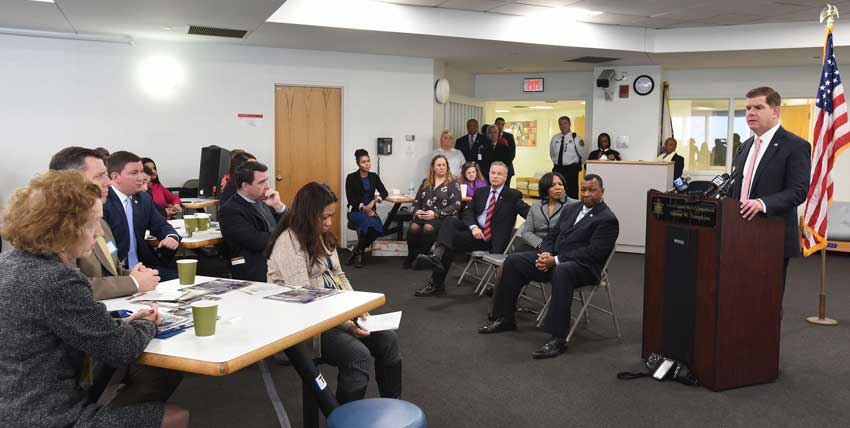Mayor Walsh, Suffolk County Sheriff Tompkins launch recovery partnership
The recovery partnership will connect inmates with recovery services.
Mayor Martin J. Walsh today joined Sheriff Steven W. Tompkins in launching a recovery partnership between the Suffolk County Sheriff's Department and the Mayor's Office of Recovery Services that will expand the delivery of recovery services to inmates during incarceration and create a continuum of care that will continue after their release.
"This program will make our communities and homes safer," said Mayor Walsh. "This initiative is about giving people second chances, and a fighting chance at recovery. It's important we build strong pathways to and from the recovery community, and these pathways must extend to our prisons. I'd like to thank the Suffolk County Sheriff's Department for their important work, and for partnering with us in this recovery effort. We look forward to continuing to grow this partnership."
The Recovery Partnership includes a series of regular recovery panels at the Suffolk County House of Corrections and the Nashua Street Jail, through which service providers, experts and relevant stakeholders will offer guidance and connections to inmates prior to their release, helping to guide the inmates through the early recovery process, and allowing them to build a network of support in the neighborhoods where they live.
This Recovery Partnership focuses on a key intervention point for populations with substance use disorders. Between June and December of 2016, the Suffolk County Sheriff's Department admitted 2,223 individuals who were in need of medical care for substance use disorder. The partnership will allow inmates to be trained on overdose prevention and Narcan use and to build relationships with providers who will help ensure their long-term recovery after release, including providers who offer outpatient care services, medically assisted treatment and recovery support groups.
"This Recovery Partnership will mean faster, stronger, and better connections for incarcerated individuals leaving our institutions and reentering their neighborhoods," said Sheriff Tompkins. "In corrections we know that what we do 'behind the wall' is impactful, but we can only do so much. We know that in order for those individuals in our care to be successful in reentering society they must develop strong, meaningful connections with people in their neighborhoods and communities."
"We're excited for this opportunity to integrate recovery services throughout the reentry continuum," said Jen Tracey, Director of the Mayor's Office of Recovery Services. "Exposing people to the services offered through the Boston Public Health Commission's Bureau of Recovery Services and by other providers in our community will allow this high risk population to be exposed to recovery services prior to their release and ensure they receive support as they transition back into the community."
Incarcerated individuals are at an increased risk of overdose when they leave jail, as often the potency of street drugs has changed during their incarceration and their tolerance to those drugs has decreased. Inmates in recovery often face a unique set of challenges as they work to reenter society while working on their recovery.


